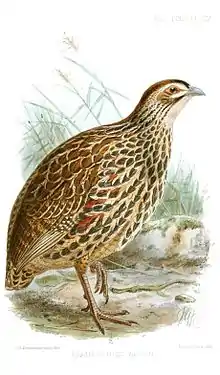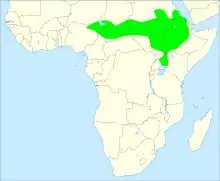Clapperton's spurfowl
Clapperton's spurfowl (Pternistis clappertoni) is a species of bird in the family Phasianidae. It is found in Cameroon, Central African Republic, Chad, Eritrea, Ethiopia, Mali, Mauritania, Niger, Nigeria, Sudan, and Uganda.
| Clapperton's spurfowl | |
|---|---|
 | |
| Scientific classification | |
| Domain: | Eukaryota |
| Kingdom: | Animalia |
| Phylum: | Chordata |
| Clade: | Dinosauria |
| Class: | Aves |
| Order: | Galliformes |
| Family: | Phasianidae |
| Genus: | Pternistis |
| Species: | P. clappertoni |
| Binomial name | |
| Pternistis clappertoni | |
 | |
geographic distribution | |
| Synonyms | |
|
Francolinus clappertoni | |
Taxonomy
Clapperton's spurfowl was described in 1826 by John George Children and Nicholas Aylward Vigors in an appendix to the Narrative of Travels and Discoveries in Northern and Central Africa by the explorers Dixon Denham and Hugh Clapperton. Children and Vigors chose to honour Clapperton and coined the binomial name Francolinus clappertoni.[2] In their publication Children and Vigors did not specify where the specimen had been collected but the type locality was later designated as Borno in northeast Nigeria.[3] The species is now placed in the genus Pternistis that was introduced by the German naturalist Johann Georg Wagler in 1832.[4][5] A molecular phylogenetic study published in 2019 found that Clapperton's spurfowl is sister to Harwood's spurfowl.[6]
Two subspecies are now recognised:[5]
- P. c. clappertoni (Children & Vigors, 1826) — Mali to south Sudan, east South Sudan, northeast Uganda and west Ethiopia[lower-alpha 1]
- P. c. sharpii (Ogilvie-Grant, 1892) — north and central Ethiopia, Eritrea
Notes
- P. c. clappertoni includes the proposed subspecies koenigseggi, heuglini, nigrosquamatus and gedgii.[5][6]
References
- BirdLife International (2016). "Pternistis clappertoni". IUCN Red List of Threatened Species. 2016: e.T22678807A92789284. doi:10.2305/IUCN.UK.2016-3.RLTS.T22678807A92789284.en. Retrieved 15 November 2021.
- Denham, Dixon; Clapperton, Hugh (1826). Narrative of Travels and Discoveries in Northern and Central Africa in the Years 1822, 1823 and 1824. London: John Murray. Appendix XXI, p. 198.
- Peters, James Lee, ed. (1934). Check-list of Birds of the World. Vol. 2. Cambridge, Massachusetts: Harvard University Press. p. 79.
- Wagler, Johann Georg (1832). "Neue Sippen und Gattungen der Säugthiere und Vögel". Isis von Oken (in German and Latin). cols 1218–1235 [1229].
- Gill, Frank; Donsker, David; Rasmussen, Pamela, eds. (2020). "Pheasants, partridges, francolins". IOC World Bird List Version 10.1. International Ornithologists' Union. Retrieved 8 February 2020.
- Mandiwana-Neudani, T.G.; Little, R.M.; Crowe, T.M.; Bowie, R.C.K. (2019). "Taxonomy, phylogeny and biogeography of African spurfowls Galliformes, Phasianidae, Phasianinae, Coturnicini: Pternistis spp". Ostrich. 90 (2): 145–172. doi:10.2989/00306525.2019.1584925. S2CID 195417777.
